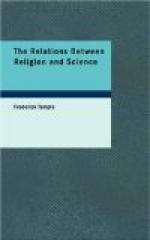APPARENT COLLISION OF SCIENCE WITH THE CLAIM TO SUPERNATURAL POWER.
St. John xiv. 11.
Believe Me that I am in the Father, and the Father in Me: or else believe Me for the very works’ sake.
The claim to work miracles parallel to the freedom of the will. The miracles of Revelation need not be miracles of Science. Our Lord’s Resurrection, and His miracles of healing, possibly not miraculous in the scientific sense. Different aspect of miracles now and at the time when the Revelation was given. Miracles attested by the Apostles, by our Lord’s character, by our Lord’s power. Nature of evidence required to prove miracles; not such as to put physical above spiritual evidence; not such as to be unsuited to their own day. Impossibility of demonstrating universal uniformity. Revelation no obstacle to the progress of Science.
LECTURE VIII.
THE CONCLUSION OF THE ARGUMENT.
1 Corinthians xii. 3.
No man can say that Jesus is the Lord, but by the Holy Ghost.
Uniformity of nature not demonstrated, but established, except in two cases; the interference of human will and of Divine Will. The exception no bar to the progress of Science. Unity to be found not in the physical world, but in the physical and moral combined. The Moral Law rests on itself. Our recognition of it on our own character and choice. But we expect it to show its marks in the physical world: and these are the purpose visible in Creation, the effects produced by Revelation. Nevertheless a demand for more physical evidence; but the physical cannot be allowed to overshadow the spiritual. Dangers to believers from leaning this way: superstition; blindness; stagnation. The guarantee for spiritual perceptiveness: to take Jesus as the Lord of the conscience, the heart, the will.
LECTURE I.
THE ORIGIN AND NATURE OF SCIENTIFIC BELIEF.
The subject introduced: Scientific belief. Mathematics and Metaphysics excluded. The Postulate of Science: the Uniformity of Nature. Hume’s account of it. Kant’s account of it. Insufficiency of both accounts. Science traced back to observation of the Human Will. The development of Science from this origin. The increasing generality of the Postulate: which nevertheless can never attain to universality.
LECTURE I.
THE ORIGIN AND NATURE OF SCIENTIFIC BELIEF.
’O Lord, how manifold
are Thy works: in wisdom hast Thou made them
all; the earth is full
of Thy riches.’—Psalm civ.
24.




